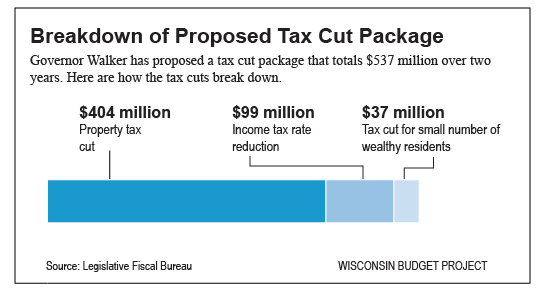*This post was updated on April 2, 2014 to address news that “bonus depreciation,” the biggest and most inefficient break among the “tax extenders” will be included in the legislation before the Senate Finance Committee this week.*
Congress appears likely to enact legislation that Capitol Hill insiders call the “tax extenders” because it extends several tax breaks that are technically temporary. These tax breaks, which mostly benefit corporations, are effectively permanent because Congress extends them every couple of years with almost no debate or oversight.
Here are four reasons why that should change this year and Congress should reject the tax extenders unless dramatic modifications are made to the legislation.
1. The tax extenders are deficit-financed tax cuts for corporations, breaking all the “fiscally responsible” rules that Congress applies to benefits for the unemployed, low-wage workers, and children.
In the past several weeks, Congress made clear that it will not enact an extension of emergency unemployment benefits (which have never been allowed to expire while the unemployment rate was as high as today’s level) unless the costs are offset to prevent an increase in the budget deficit.
Congress has also, in the last several years, enacted automatic spending cuts of about $109 billion a year known as “sequestration” in order to address an alleged budget crisis. Even popular public investments like Head Start and medical research were slashed. The chairman of the House and Senate Budget Committees (Republican Paul Ryan and Democrat Patty Murray) struck a deal in December that undoes some of that damage but leaves in place most of the sequestration for 2014 and barely touches it in 2015.
Meanwhile, lawmakers have expressed almost no concern that the “tax extenders” are enacted every two years without any provisions to offset the costs. According to figures from the Congressional Budget Office, if Congress continues to extend these breaks every couple years, they will reduce revenue by at least $700 billion over a decade.

2. “Bonus depreciation,” the most costly of the tax extenders, is supposed to encourage businesses to invest, but there is little evidence that it has this effect.
Bonus depreciation is a significant expansion of existing breaks for business investment. Congress does not seem to understand that business people make decisions about investing and expanding their operations based on whether or not there are customers who want to buy whatever product or service they provide. A tax break subsidizing investment will benefit those businesses that would have invested anyway but is unlikely to result in much new investment.
Companies are allowed to deduct from their taxable income the expenses of running the business, so that what’s taxed is net profit. Businesses can also deduct the costs of purchases of machinery, software, buildings and so forth, but since these capital investments don’t lose value right away, these deductions are taken over time.
Bonus depreciation is a temporary expansion of the existing breaks that allow businesses to deduct these costs more quickly than is warranted by the equipment’s loss of value or any other economic rationale.
We believed bonus depreciation to be truly temporary until recently because there was very little talk in Congress of extending this particular break. The fact that it is included in the legislative package before the Senate Finance Committee is startling.
A report from the Congressional Research Service reviews efforts to quantify the impact of bonus depreciation and explains that “the studies concluded that accelerated depreciation in general is a relatively ineffective tool for stimulating the economy.”
3. The second most costly of the tax extenders is the research credit, which is supposed to encourage research but actually subsidizes activities no one would call research, and activities that companies would do in the absence of any subsidy.
A report from Citizens for Tax Justice explains that the research credit needs to be reformed dramatically or allowed to expire. One aspect of the credit that needs to be reformed is the definition of research. As it stands now, accounting firms are helping companies obtain the credit to subsidize redesigning food packaging and other activities that most Americans would see no reason to subsidize. The uncertainty about what qualifies as eligible research also results in substantial litigation and seems to encourage companies to push the boundaries of the law and often cross them.
Another aspect of the credit that needs to be reformed is the rules governing how and when firms obtain the credit. For example, Congress should bar taxpayers from claiming the credit on amended returns, because the credit cannot possibly be said to encourage research if the claimant did not even know about the credit until after the research was conducted.
As it stands now, some major accounting firms approach businesses and tell them that they can identify activities the companies carried out in the past that qualify for the research credit, and then help the companies claim the credit on amended tax returns. When used this way, the credit obviously does not accomplish the goal of increasing the amount of research conducted by businesses.
4. Another costly provision among the tax extenders would extend a break called the “active finance exception,” which should be called the “G.E. Loophole.”
In a famous story reported in the New York Times in 2011, the director of General Electric’s 1,000-person tax department literally got on his knees in the office of the House Ways and Means Committee as he begged for an extension of the “active finance exception,” which allows G.E. to “defer” (indefinitely delay) paying any U.S. taxes on offshore profits from financing loans.
The general rule is that American corporations are allowed to “defer” U.S. taxes on offshore profits that take the form of “active” income (what most of us think of as payment for selling a good or service) as long as those profits are officially offshore. The general rule also is that American corporations cannot defer U.S. taxes on “passive” income like dividends or interest on loans, because passive income is extremely easy to shift from one country to another for the purpose of tax avoidance.
G.E. managed to get Congress to enact an exception, so that it can defer paying U.S. taxes on offshore financial income that it calls “active finance” income — which is ridiculous because these profits are the ultimate example of the sort of passive income that can be easily shifted between countries. G.E. publicly acknowledges (in the information it provides to shareholders by filing with the Securities and Exchange Commission) that the company relies on the active finance exception to reduce its taxes.
Congress should eliminate deferral or further restrict it to prevent corporations from making their U.S. profits appear to be earned in offshore tax havens, but this break actually expands deferral.
 Less than a year after enacting a significant (and progressive) revenue raising tax package, Minnesota Governor Mark Dayton signed off last week on more than $400 million of tax cuts. The new legislation repeals several changes put into place last year including removing warehouse storage and 2 other primarily business services from the sales tax base and eliminating a new gift tax. The tax cuts also include reductions in the personal income tax via aligning the state’s tax code more closely to federal rules. Low- and moderate-income working families will also see a small benefit from two changes made to the state’s Working Families Credit (Minnesota’s version of a state Earned Income Tax credit (EITC).
Less than a year after enacting a significant (and progressive) revenue raising tax package, Minnesota Governor Mark Dayton signed off last week on more than $400 million of tax cuts. The new legislation repeals several changes put into place last year including removing warehouse storage and 2 other primarily business services from the sales tax base and eliminating a new gift tax. The tax cuts also include reductions in the personal income tax via aligning the state’s tax code more closely to federal rules. Low- and moderate-income working families will also see a small benefit from two changes made to the state’s Working Families Credit (Minnesota’s version of a state Earned Income Tax credit (EITC).
 A new web tool, the
A new web tool, the 
 Tax cuts for corporations and wealthy individuals were on the table in Idaho this year, but lawmakers ultimately decided that adequately funding education is more important. Governor Butch Otter
Tax cuts for corporations and wealthy individuals were on the table in Idaho this year, but lawmakers ultimately decided that adequately funding education is more important. Governor Butch Otter  A battle over New York Governor Andrew Cuomo’s proposed
A battle over New York Governor Andrew Cuomo’s proposed Last week, Ohio Governor John Kasich released his “
Last week, Ohio Governor John Kasich released his “




